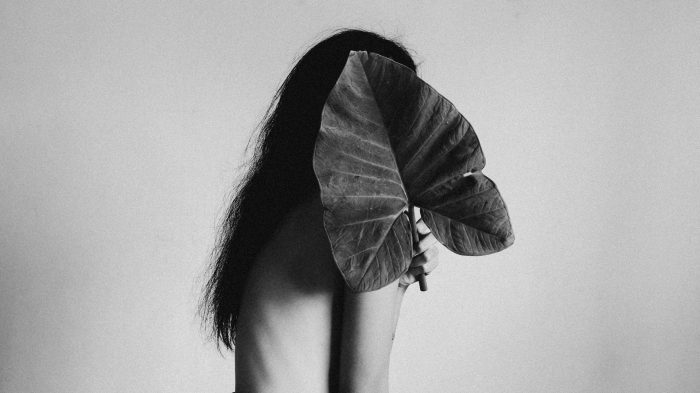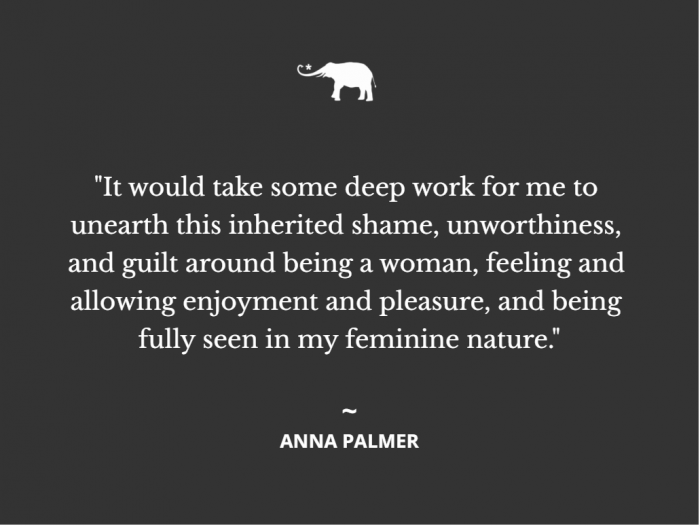*Editor’s Note: Elephant Journal articles represent the personal views of the authors, and can not possibly reflect Elephant Journal as a whole. Disagree with an Op-Ed or opinion? We’re happy to share your experience here.
~
The following article is an excerpt from Anna Palmer’s book, Coming Home: Healing From an Eating Disorder by Finding Beauty in Imperfection. May the words here grant you deeper permission to come home to the fullness of yourself, humanness, divinity, and all. Welcome home.
~
Chapter 7. Shame on You: The Dark Side of Religion
The Bible tells you to be a “good” girl or boy. It tells you to follow the rules and the Ten Commandments. You must obey your parents and purify your sins by seeking the forgiveness of God, or Jesus Christ as Lord and Savior.
This is just one shade of the many hues of man-made religion. Judeo-Christianity’s basic premise is that we are born into sin and therefore, we are sinners. We are inherently “bad” people, simply because we’re human.
I was a “believer” for the first 19 years of my life. I believed in Jesus as my Lord and Savior. I prayed and went to church.
As an aside, none of what I share here is to condemn religious beliefs. Many find refuge, faith, and love in religious traditions. Faith is a beautiful irreplaceable aspect of religion. It is one I had to lose and regain to find my own sense and meaning of. I lost faith for some time due to my own fears and the soul searching that was necessary to find myself again.
We are not meant to walk alone, I have learned. But shame and guilt can be a huge (perhaps, unintended, but pervasive, nonetheless) side effect of religion. I needed to separate out these aspects for myself, to restore my faith in an unconditionally loving God, not a human-made one of judgment and condemnation.
Repairing faith in the spiritual sense, away from the guilt and shame, took time. I still have to remind myself that faith in a benevolent being is a vital part of my own healing journey.
But, guilt, shame, and judgment were no longer a helpful lens through which to view the God I believed, nor were they healthy ways to view myself. I had to re-create my relationship to a higher being and presence. But I also had to dig through a lot of the bullsh*t that religion teaches you too.
I share this to give a voice to perhaps a different, less spoken about element of religious upbringing. I share my perspective to shine light on the human-created shaming and guilting aspects of religion and of many formalized religions’ version of church and God.
They perpetuate the insidious notion that who and what we are innately is wrong and bad. We’re indoctrinated to believe that we are lacking something and in need of fixing—through religion’s vehicles of repentance and unwavering faith. It is the notion that we need to be forgiven and spend our lives apologizing for our very existence and sinful nature.
The church is a human-made sociocultural institution. I believed for the earlier part of my life that the view of truth offered by Christianity was, indeed, the whole truth. I believed that a masculine, patriarchal God was supreme ruler over all. And, that I was a mere flawed mortal.
Who was I to be worthy of love if I was, in fact, a sinner? Even with the grace and forgiveness factor that Jesus Christ came to epitomize, Christianity sent me a clear message: I was inherently bad.
I attended a private Christian school until 7th grade. The young, innocent girl in me knew no different than what I’d been taught. My younger self did find a lot of ceremonial joy singing songs at church to some higher being. My heart resonated with the offering of one’s heart to this spiritual component of life. But, even the love of the church felt conditional.
When I was a freshman in college and diving deep into the second and more relentless bout of my eating disorder, I began to question the beliefs I had fervently accepted as truth.
I had suffered for the last few years of my life, trapped in the dark hole of bulimia and depression. I had prayed. I had pleaded from the depths of my being for God to save me, for God to rescue me from the demons I was fighting day after day.
I didn’t understand why I wasn’t getting any better, why God wasn’t rescuing me. I could only assume that it was because I was deserving of my suffering. I believed that I was being punished for being a bad girl, for sinning, for being a bad friend back in my elementary years. I truly believed I was unworthy of grace and love. I desperately prayed and pleaded with all of my might but felt deep down that no outside God was coming to save me.
My bulimia was in full force my freshman year of college. Binging and purging ruled my mind. Any off chance I got, I was devouring large amounts of food at the dorm cafeteria and secretly purging in one of the less used bathrooms in my dorm building.
I was still attending classes and exceling. I don’t think I ever even skipped a class. I was loyal to my straight-A academia identity. I studied hard. I got excellent grades, and I even managed to keep up friendships from my high school years, as they attended the same college as me.
I was keeping my bulimic life a secret though. I would lie to my friends just to get away with this secret life. Bulimia morphs your basic character into a lying, cheating, stealing version of yourself. Shrouded in shame, lying, stealing, and sneaking around become the only means to cope with such an “ugly” feeling dis-ease.
Shame and guilt mark most bulimic behaviors. You feel enormously guilty about eating at all, eating forbidden foods, or for losing control and finding yourself in a full-blown binge following prior restriction and diet mentality.
I truly believe that the emotional rollercoaster of bulimia stems from the diet mentality, coupled with low self-esteem, trauma, emotional repression, and pain. Diets and a restrictive mindset don’t directly cause bulimia, but they do play a big role in how it plays out.
It did for me, at least. In high school, I put myself on a restrictive “diet,” lowered my caloric intake, and eliminated certain food groups. This self-induced starvation sends the brain and survival instincts into overdrive.
The brain seizes any opportunity to binge because it never knows when the next self-induced famine will be. It’s a very primal survival instinct. Add to that the emotional strife and turmoil of self-hatred, negative body shaming, guilt, and shame ridden food behaviors, low self-esteem, and underlying trauma or unprocessed emotions, and you get the jumbled mess that is bulimia.
Bulimia is not a “pretty” disease. It is a messy, lose all control, lose all care for the way one behaves in the heat of the moment when the need to use a behavior (i.e. binge or purge) strikes.
Bulimia lends itself to total tunnel vision. All you can think about is getting from point A to B. First, get the food. Second, engulf the food. Third, purge to get rid of the food. Lather. Rinse. Repeat.
It is compulsive. It is an addictive rush of losing control, purging the emotions, and purifying the self. It is a chemical disturbance of the brain and body.
The noticeable repercussions on the body from bulimic behaviors include: decaying teeth, cavities, worn enamel, throat scarring, acid reflux, IBS related symptoms, heart palpitations, gastric issues or tearing, hormonal problems, and loss of a menstrual cycle. Bulimia wreaks havoc on the body as well as the psyche.
Bulimia makes a sane person feel utterly mad. The cycle of shame and guilt, fear, and self-loathing keeps you stuck in a downward spiral. Bulimia utterly exhausts the mind, body, and spirit. It never gives you a day off.
After a binge, you promise to yourself you’ll get back on your “clean” diet. And, maybe for some time, you are “good” again. Until stress and overwhelm hit amid excessive hunger and starvation, and then the cycle of binging, purging, and restriction begins all over again.
It took me ten years to fully comprehend that I had to stop dieting if I wanted to recover. I tried for so many years to recover by simply dieting again, and eating restrictively, healthy, and “clean.” It would maybe “work” for some time, but inevitably, I would find myself over the toilet, purging myself of the guilt and shame from eating and binging on “forbidden” foods.
Since recovering, I have observed that in my bulimic days the notion of guilt and shame and depriving myself of nourishment were driving factors of the ED, which stemmed from unprocessed emotions and mis-identification with my own pain body, i.e. emotional trauma body. There was also a correlation between my shameful behavior and my religious upbringing, which lent itself to feeling deep guilt and shame.
Christianity and Catholicism, especially, preach that sin is the human evil of the world, brought on by Eve’s decision to eat the forbidden apple in the Garden of Eden. In essence, the story tells us that a woman brought the first sin into the world by eating the sweet fruit and allowing her pleasure-seeking nature to guide her.
It would take some deep work for me to unearth this inherited shame, unworthiness, and guilt around being a woman, feeling and allowing enjoyment and pleasure, and being fully seen in my feminine nature.
I was a “good” girl for so much of my life. I followed the rules. I got good grades. I learned my Bible verses. I was a good, loyal friend. I said my “pleases and thank yous.” I prayed to God. I asked Jesus Christ to be my savior. That is, until, I chose differently.
My religious upbringing felt very robotic. I thought being “good” meant I would be saved from the pain that life inevitably brings. My innocence complex told me that bad things only happen to bad people. So, when bad things started to happen to me, I believed myself to be bad too.
I don’t argue against the idea that religion and Christianity can instill morals, such as: be a kind human being (the number one that is so often missed in the judgmental lens religion upholds as its crucible), obey your parents, and the Golden Rule of treating others how you would like to be treated (which is espoused but not often carried out), as well as extend compassion and love to others (but so often, religion forgets to include the self in that).
These can be beautiful, healing aspects of religion. This is perhaps, the light side of religion. The dark side, however, is much less talked about.
The dark harbors and promotes views of women as less than, the patriarchal principles of modern religion, and the shaming principles based on the premise of sin.
~
Read part one of this series: Coming Home: On Healing from an Eating Disorder.
Read part two of this series: How Eating Disorders are a way of Coping with Emotions & the Effects of Traumatic Events.
Read part three of this series: Hello Bulimia, My Secret Friend: When Food Becomes Survival & the Body the Enemy.
Read part four of this series: The Real Toxin: The Harm of our Fat-Phobic Culture.
Read part five of this series: How Eating Disorders Feed on the Insecure Self.
Read part six of this series: What Sparked my Healing Journey from an Eating Disorder.
~














Read 10 comments and reply